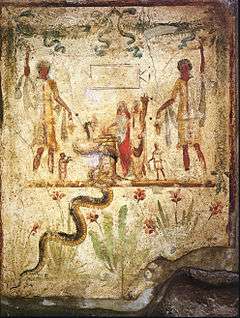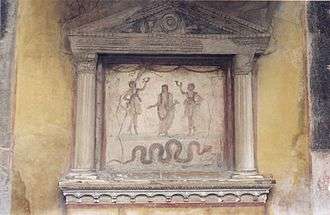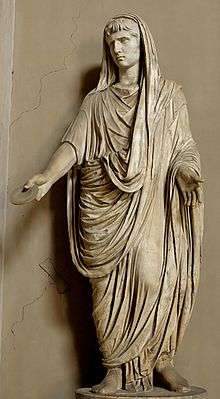Genius (mythology)

In Roman religion, the genius (Latin: [ˈɡɛ.nɪ.ʊs]; plural geniī) is the individual instance of a general divine nature that is present in every individual person, place, or thing.[1] Much like a guardian angel, the genius would follow each man from the hour of his birth until the day he died.[2] For women it was the Juno spirit that would accompany each of them. The Greeks called their genii daemons, and believed in them from the earliest times.[3]
Nature of the genius
The rational powers and abilities of every human being were attributed to their soul, which was a genius.[4] Each individual place had a genius (genius loci) and so did powerful objects, such as volcanoes. The concept extended to some specifics: the genius of the theatre, of vineyards, and of festivals, which made performances successful, grapes grow, and celebrations succeed, respectively. It was extremely important in the Roman mind to propitiate the appropriate genii for the major undertakings and events of their lives.
Specific genii
_01.jpg)
Although the term genius might apply to any divinity whatsoever, most of the higher-level and state genii had their own well-established names. Genius applied most often to individual places or people not generally known; that is, to the smallest units of society and settlements, families and their homes. Houses, doors, gates, streets, districts, tribes, each one had its own genius.[5] The supreme hierarchy of the Roman gods, like that of the Greeks, was modelled after a human family. It featured a father, Jupiter , who was also the supreme divine unity, and a mother, Juno, queen of the gods. These supreme unities were subdivided into genii for each individual family; hence, the genius of each female, representing the female domestic reproductive power, was a Juno. The male function was a Jupiter.[6]
The juno was worshipped under many titles:
- Iugalis, "of marriage"
- Matronalis, "of married women"
- Pronuba, "of brides"
- Virginalis, "of virginity"
Genii were often viewed as protective spirits, as one would propitiate them for protection. For example, to protect infants one propitiated a number of deities concerned with birth and childrearing: Cuba ("lying down to sleep"), Cunina ("of the cradle") and Rumina ("of breast-feeding").[7] Certainly, if those genii did not perform their proper function well, the infant would be in danger.
Hundreds of lararia, or family shrines, have been discovered at Pompeii, typically off the atrium, kitchen or garden, where the smoke of burnt offerings could vent through the opening in the roof. A lararium was distinct from the penus ("within"), another shrine where the penates, gods associated with the storerooms, was located. Each lararium features a panel fresco containing the same theme: two peripheral figures (Lares) attend on a central figure (family genius) or two figures (genius and Juno) who may or may not be at an altar. In the foreground is one or two serpents crawling toward the genius through a meadow motif. Campania and Calabria preserved an ancient practice of keeping a propitious house snake, here linked with the genius.[8] In another, unrelated fresco (House of the Centenary) the snake-in-meadow appears below a depiction of Mount Vesuvius and is labelled Agathodaimon, "good daimon", where daimon must be regarded as the Greek equivalent of genius.
History of the concept
Origin
Etymologically genius (“household guardian spirit”) has the same derivation as nature from gēns (“tribe”, “people”) from the Indo-European root *gen-, "produce."[9] It is the indwelling nature of an object or class of objects or events that act with a perceived or hypothesized unity.[10] Philosophically the Romans did not find the paradox of the one being many confusing; like all other prodigies they attributed it to the inexplicable mystery of divinity. Multiple events could therefore be attributed to the same and different divinities and a person could be the same as and different from his genius. They were not distinct, as the later guardian angels, and yet the Genius Augusti was not exactly the same as Augustus either. As a natural outcome of these beliefs, the pleasantness of a place, the strength of an oath, an ability of a person, were regarded as intrinsic to the object, and yet were all attributable to genius; hence all of the modern meanings of the word. This point of view is not attributable to any one civilization; its roots are lost in prehistory. The Etruscans had such beliefs at the beginning of history, but then so did the Greeks, the native Italics and many other peoples in the Near and Middle East.
Genii under the monarchy
No literature of the monarchy has survived, but later authors in recounting its legends mention the genius. For example, under Servius Tullius the triplets Horatii of Rome fought the triplets Curiatii of Alba Longa for the decision of the war that had arisen between the two communities.In the battle, the three Curiatii were wounded, but two of the Horatii were killed. The last of the Horatii, Publius, turned as if to flee. The Curiatii chased him but, as a result of their wounds, became separated. This enabled Publius to slay them one by one. When the victorious Publius returned carrying the spoils of victory, his sister, who had been betrothed to one of the Curiatii, began to keen, breast-beat and berate Publius. He executed her, was tried for murder, was acquitted by the Roman people but the king made him expiate the Juno of his sister and the Genius Curiatii, a family genius.[11](see Horatii)
Republican genii
The genius appears explicitly in Roman literature relatively late as early as Plautus, where one character in the play, Captivi, jests that the father of another is so avaricious that he uses cheap Samian ware in sacrifices to his own genius, so as not to tempt the genius to steal it.[12] In this passage, the genius is not identical to the person, as to propitiate oneself would be absurd, and yet the genius also has the avarice of the person; that is, the same character, the implication being, like person, like genius.
Implied geniuses date to much earlier; for example, when Horatius Cocles defends the Pons Sublicius against an Etruscan crossing at the beginning of the Roman Republic, after the bridge is cut down he prays to the Tiber to bear him up as he swims across: Tiberine pater te, sancte, precor ..., "Holy father Tiber, I pray to you ...." The Tiber so addressed is a genius. Although the word is not used here, in later literature it is identified as one.[13]
Horace describes the genius as "the companion which controls the natal star; the god of human nature, in that he is mortal for each person, with a changing expression, white or black".[14]
Imperial genii

Octavius Caesar on return to Rome after the final victory of the Roman Civil War at the Battle of Actium appeared to the Senate to be a man of great power and success, clearly a mark of divinity. In recognition of the prodigy they voted that all banquets should include a libation to his genius. In concession to this sentiment he chose the name Augustus, capturing the numinous meaning of English "august." This line of thought was probably behind the later vote in 30 BC that he was divine, as the household cult of the Genius Augusti dates from that time. It was propitiated at every meal along with the other household numina.[15] The vote began the tradition of the divine emperors; however, the divinity went with the office and not the man. The Roman emperors gave ample evidence that they personally were neither immortal nor divine.

If the genius of the imperator, or commander of all troops, was to be propitiated, so was that of all the units under his command. The provincial troops expanded the idea of the genii of state; for example, from Roman Britain have been found altars to the genii of Roma, Roman aeterna, Britannia, and to every legion, cohors, ala and centuria in Britain, as well as to the praetorium of every castra and even to the vexillae.[16] Inscriptional dedications to genius were not confined to the military. From Gallia Cisalpina under the empire are numerous dedications to the genii of persons of authority and respect; in addition to the emperor's genius principis, were the geniuses of patrons of freedmen, owners of slaves, patrons of guilds, philanthropists, officials, villages, other divinities, relatives and friends. Sometimes the dedication is combined with other words, such as "to the genius and honor" or in the case of couples, "to the genius and Juno."[17]
Surviving from the time of the empire hundreds of dedicatory, votive and sepulchral inscriptions ranging over the entire territory testify to a floruit of genius worship as an official cult. Stock phrases were abbreviated: GPR, genio populi Romani ("to the genius of the Roman people"); GHL, genio huius loci ("to the genius of this place"); GDN, genio domini nostri ("to the genius of our master"), and so on. In 392 AD with the final victory of Christianity Theodosius I declared the worship of the Genii, Lares and Penates to be treason, ending their official terms.[18] The concept, however, continued in representation and speech under different names or with accepted modifications.
Roman iconography
Coins
The genius of a corporate social body is often a cameo theme on ancient coins: a denarius from Spain, 76–75 BC, featuring a bust of the GPR (Genius Populi Romani, "Genius of the Roman People") on the obverse;[19] an aureus of Siscia in Croatia, 270–275 AD, featuring a standing image of the GENIUS ILLVR (Genius Exercitus Illyriciani,[20] "Genius of the Illyrian Army") on the reverse;[21] an aureus of Rome, 134–138 AD, with an image of a youth holding a cornucopia and patera (sacrificial dish) and the inscription GENIOPR, genio populi Romani, "to the genius of the Roman people," on the reverse.[22]
|
Modern-era representations
-

Genius of love, Meister des Rosenromans, c. 1420-1430
-
Genius of victory, Michelangelo, 1532–34
-

Genius of Palermo, Ignazio Marabitti, c. 1778
-

Genius of liberty, Augustin Dumont, 1840
-

Genius of Alexander, Marie Louise Elisabeth Vigée-Lebrun, 1814
-

Genius of war, Elías Martín, 19th century
-

Genius of the resistance, Antoine Etex, 1833–36
-

Genius of Beethoven
-

Genius of America, Adolphe Yvon, 1858
-

Genius of the Peace of Paris, by Chr. Dan. Rauch
-
.jpg)
Genius by Carl Milles, 1932–40
See also
References
- ↑ Lewis, Charlton T.; Short, Charles (2009). "genius". A Latin Dictionary. Meford, MA: Perseus Digital Library, Tufts University. Retrieved 1 July 2009.
- ↑ Mary Ann Dwight Grecian and Roman Mythology p.253
- ↑ Mary Ann Dwight Grecian and Roman Mythology p.254
- ↑ St. Augustine. "VII.13". In Dyson, R.W. The City of God against the Pagans. p. 284. ISBN 0-14-044894-2.
Varro says that a 'genius' is the rational soul of each man ... and that the soul of the world itself is a universal 'genius', and that this is what they call Jupiter.
- ↑ Grimal, P. (1965). "Rome: Gods by Conquest". Larousse World Mythology. The Hamlyn Publishing Group Limited. p. 181.
- ↑ Fox, William Sherwood (1916). Gray, Louis Herbert; Moore, George Foot, eds. The Mythology of All Races. I Greek and Roman. Boston: Marshall Jones Company. p. 291. ISBN 0-8154-0073-X.
- ↑ Schmitz, Leonhard (1867, 2005). "Cuba". In Smith, William. Dictionary of Greek and Roman Biography and Mythology. 1. Little, Brown & Company, The Ancient Library. p. 900. Check date values in:
|date=(help) - ↑ Orr, David Gerald (1980). Browne, Ray Broadus, ed. Roman Domestic Religion: The Archaeology of Roman Popular Art. Rituals and Ceremonies in Popular Culture. Bowling Green, Ohio: Bowling Green University Popular Press. pp. 88–103.
- ↑ Harper, Douglas (2001). "Genius". Online Etymological Dictionary. Retrieved 2 July 2009.
- ↑
- gen- assumed many related meanings. A (g)natura was the thing with which one was "produced" or "born"; i.e., something innate. The writers of the late Republic and empire viewed it in that way (see introduction). An alternative view is repeated by De Grummond, Nancy Thomson (2006). Etruscan myth, sacred history, and legend. Philadelphia, PA: University of Pennsylvania Museum of Archaeology and Anthropology. p. 143.
The name Genius belongs to a fertility spirit and means literally 'the begetter'....
De Grummond draws some parallels to Etruscan geniuses (so labelled by the Roman writers), such as Tages and his father Mariś. Presumably, the meaning of family protective spirit would have been the original; however, without definitive connecting evidence the origin of the Roman genius remains speculative. It was either male or female, performed any function, and was associated with anything, not just people.
- gen- assumed many related meanings. A (g)natura was the thing with which one was "produced" or "born"; i.e., something innate. The writers of the late Republic and empire viewed it in that way (see introduction). An alternative view is repeated by De Grummond, Nancy Thomson (2006). Etruscan myth, sacred history, and legend. Philadelphia, PA: University of Pennsylvania Museum of Archaeology and Anthropology. p. 143.
- ↑ Dionysius of Halicarnassus. "III.22". Roman Antiquities. ISBN 0-674-99352-7.
- ↑ Plautus, Titus Maccius. "Captivi". Perseus Digital LIbrary. Retrieved 4 July 2009.
|chapter=ignored (help) - ↑ Belcher, Henry (1882). The Second Book of Livy. London: Rivingtons. p. 114 on II.58.
- ↑ Horace, Epistles, II, 2, 379.
- ↑ Fishwick, Duncan (1987–2005). The imperial cult in the Latin West: studies in the ruler cult of the western provinces of the Roman Empire. 2 Part 1. Leiden ; New York: E.J. Brill. pp. 375–377. ISBN 90-04-07179-2.
- ↑ Ward, John (2003) [1911]. "Chapter VI Religions of Roman Britain". Roman Era in Britain. London, Chicago: Methuen & Co. Ltd.; LacusCurtius, University of Chicago. pp. 102–103.
- ↑ Murley, Joseph Clyde (1922). The cults of Cisalpine Gaul as seen in the inscriptions. Menasha Wisconsin: George Banta Publishing Company. pp. 19–24.
- ↑ Duruy, Victor (1885). Mahaffy, John Pentland, ed. History of Rome and the Roman people. IV. Boston: Dana Estes & Charles E. Lauriat. p. 165. ISBN 1-4325-5089-6. The authors cite Codex Theodosianus XVI.x.xii.
- ↑ "Bust of Genius Populi Romani, Illustration of Boston 42.527". Medford: Perseus Digital Library, Tufts University. 1998. Retrieved 2 July 2009.
- ↑ Rasche, Christopher, ed. (1785). Lexicon Universae Rei Numariae Veterum et Praecipue Graecorum ac Romanorum. 2 Part 1. Libraria Gleditschia. p. 1379.
- ↑ "Genius, wearing modius on head, holding a wreath; military standard at right, Illustration of Boston 66.426". Medford: Perseus Digital Library, Tufts University. 1998. Retrieved 2 July 2009.
- ↑ "Reverse: Genius standing: Illustration of Boston 1974.521". Medford: Perseus Digital Library, Tufts University. 1998. Retrieved 12 July 2009.
Additional reading
- Dwight, Mary Ann (1860). "Genii and Inferior Deities". Grecian and Roman mythology. New York: A.S. Barnes & Burr. ISBN 0-524-02016-7.
- Fowler, W. Warde (2007). "Lecture I: Sketch of the Course: Domestic Deities". Roman Ideas of Deity in the Last Century before the Christian Era - Lectures Delivered in Oxford for the Common University Fund. Holyoake Press. ISBN 978-1-4067-6774-2.
External links
| Wikimedia Commons has media related to Genius. |
- Schmitz, Leonhard (1867, 2005). "Genius". In Smith, William. Dictionary of Greek and Roman Biography and Mythology. 2. Little, Brown & Company, The Ancient Library. pp. 241–242. Check date values in:
|date=(help) - Brewer, E. Cobham, ed. (1894, 2009). "Genius, Genii (Roman mythology)". Dictionary of Phrase and Fable. fromoldbooks.org. Retrieved 3 July 2009. Check date values in:
|date=(help) - "Genius". mythindex.com. 2007–2008. Retrieved 3 July 2009.





